Establishing New Partnership
between Japan and Southeast Asia
May 24th (Mon) 2021 13:00~14:00 (UTC+7)

Summary
In the first session of “ASEAN-Japan Business Week”, powerful and encouraging messages were delivered by the leaders of the public and private sectors of both ASEAN and Japan toward establishing new partnership between Japan and Southeast Asia.
In the beginning of the session, Minister Kajiyama stressed that there are new business opportunities for Japanese companies in ASEAN region where they can contribute to sustainable business growth while solving the social problems through innovation in the region.
He also mentioned the importance of promoting co-creation of innovation through collaboration between ASEAN and Japan while learning from local dynamism, such as the rapid progress of digitalization in ASEAN. In addition, he emphasized on "Green Growth" for ASEAN-Japan cooperation, and announced the launch of "Asia Energy Transition Initiative (AETI)", targeted to achieve sustainable economic growth and carbon neutrality in Asia, with concrete support measures based on five pillars.
Finally, he reiterated the need for Japanese companies’ management to understand that ASEAN is at a major turning point and that companies need to take the challenges - as an opportunity to build their new business models. He hoped this ASEAN-Japan Business Week would be a drive for Japanese companies to consider next steps for their ASEAN expansion plans.
Secretary-General of ASEAN Dato Lim highlighted the significance of digitalization and sustainability that are critical to ASEAN recovery efforts along with the recent launch of the Mid-Term Review (MTR) Report of the ASEAN Economic Community Blueprint 2025. He added that he expected Japanese business community to continue maximizing cross-border manufacturing and production activities within the ASEAN region, restoring the supply chain by the use of digital technologies such as e-commerce as well as focusing on sustainable investment towards carbon neutrality.
Next, from the Japanese industry, Mr. Sasaki, Chairman of the Japan External Trade Organization (JETRO), Mr. Mimura, Chairman of the Japan Chamber of Commerce and Industry (JCCI), and Mr. Hara, Chairman of Committee on Asia and Oceania, Keidanren, gave their speeches on the theme of "new business opportunities expanding to Southeast Asia”.
Chairman Sasaki underscored the ASEAN-Japan partnership in industrial development and reiterated ASEAN region as a hub of supply chain and increasing digital solutions. He also introduced the J-Bridge, which was launched as a platform for encouraging collaboration between ASEAN and Japan startups/businesses and further shared his enthusiasm for such collaboration.
Chairman Mimura gave emphasis on the importance of business transformation through digitalization amid COVID-19 pandemic, and underscored the SME’s key focus on overseas business development in SEA as emerging business opportunities. Furthermore, he introduced a new project called "Overseas Business Development Initiative" collaborated with JETRO, JICA and local JCCIs throughout Japan to actively support overseas business operations especially SMEs.
Mr. Hara highlighted the importance of digitalization amid pandemic, DX promotion and global economic recovery in post pandemic era in solving global agenda and creating a sustainable society. With this awareness, he further introduced “. The NEW Growth Strategy” which Keidanren published last November, emphasizing the importance for business sector to jointly work and create value co-creation with international community, especially ASEAN, in solving social problems and achieve economic growth. He also stressed the necessity for promoting the co-creation with ASEAN in three fields: 1) strengthening ASEAN connectivity which Japanese companies have long been engaged especially in terms of both hardware and software infrastructure, 2) digital technology for social development through cooperation with ASEAN startups, and 3) sustainable growth.
To conclude this session, Mr. Tamura, Deputy Director-General of the Ministry of Economy, Trade and Industry, gave a keynote speech titled "Deepening Japanese Engagement with ASEAN Region in the Post-COVID Era". In recognition of ASEAN-Japan longstanding relation, he therefore addressed three core pillars for future ASEAN-Japan cooperation, 1) strengthening cooperation towards the early recovery from COVID-19 pandemic 2) transformation to lucrative business model by co-creating businesses with ASEAN’s local partners with use of open innovation, and 3) enhancing energy transition and partnership on green growth, adding that the Ministry of Economy, Trade and Industry is promoting policies based on these core pillars.
Opening remarks: New Partnership of “Co-Creation” for Mutual Prosperity
Kajiyama Hiroshi (Minister of Economy, Trade and Industry)
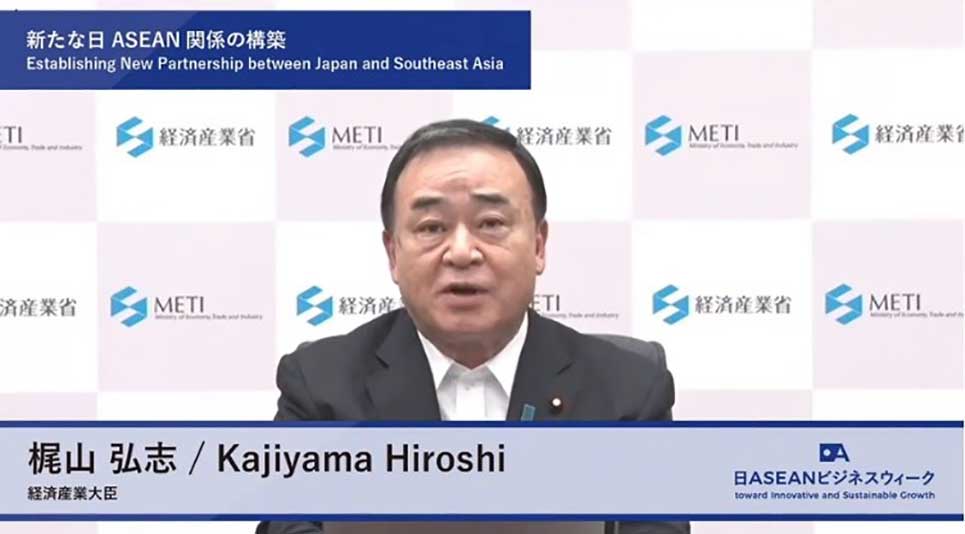
The economic relation which ASEAN and Japan built over a half century, has constantly been evolving and forming the win-win relations. Currently, Japan’s business in ASEAN region is at a great turning point due to the changing needs of ASEAN countries and intensifying competition with other countries. While ASEAN continues to perform remarkable economic growth, there is an urgent need to deal with social challenges such as traffic congestion in urban areas and economic disparities among regions. It means there are new business opportunities for Japanese companies in ASEAN region where they can contribute to sustainable business growth while solving these social challenges through innovation.
Economic cooperation between Japan and ASEAN is also moving forward to a new stage. Last year, despite the worldwide pandemic, active discussions among economic ministers were carried out resulting in the endorsement of “ASEAN-Japan Economic Resilience Action Plan” containing over 50 cooperation projects.
One of the most symbolic projects is "Asia DX Project”. In ASEAN region, digital innovation is developed and implemented faster than in Japan, and this trend is further accelerated by COVID-19 crisis. I believe Japanese enterprises learn a lot from this regional dynamism and contribute to solve the social issues with technologies and know-hows. The public and private sectors in Japan and ASEAN should thus work together to promote the co-creation of innovation.
Another important focus for ASEAN-Japan cooperation in post-COVID-19 period is "the implementation of green growth”. Namely, countries around the world are required to further increase or advance their greenhouse gas reduction targets toward COP26, by the end of this year. Moreover, in the international financial industry, divestment movements, especially from fossil fuel projects, are moving rapidly. However, the conditions of industrial and social structure in individual country are different, and there is no single optimal solution for achieving carbon neutrality. It is absolutely essential to achieve diverse and realistic energy transitions that utilize all energy sources and technologies, especially in Asia, where energy demand is rapidly increasing.
For this reason, Japan newly proposes "Asia Energy Transition Initiative (AETI)" with a package of concrete support measures based on five pillars including; 1) Support drawing roadmaps for energy transitions in Asia, 2) Presentation and dissemination of Asian version of transition finance, 3) USD 10 billion financial support for projects such as renewable energy/energy saving and LNG, 4) Technology development and deployment through 2 trillion yen fund support, 5) human resource development related to decarbonization technologies and knowledge sharing through Asian CCUS network. Japan also continues to hold further discussions with ASEAN and broaden ideas of need for practical transitions to the international community including other Asian countries, the United States, Canada, Australia and the Middle East.
ASEAN is going through a major turning point which is a great transformation opportunity for Japanese companies to establish new business models, and win the competitions while assimilating various changes surrounding ASEAN. In this connection, sharing Japanese awareness in management of Japanese businesses would also be of importance along with the support from Japanese government to fully back up and tackle with the challenges of those companies. We hope that ASEAN-Japan Business Week would be a drive for Japanese companies to consider next steps for their ASEAN expansion plans.
Lim Jock Hoi (Secretary-General of ASEAN)
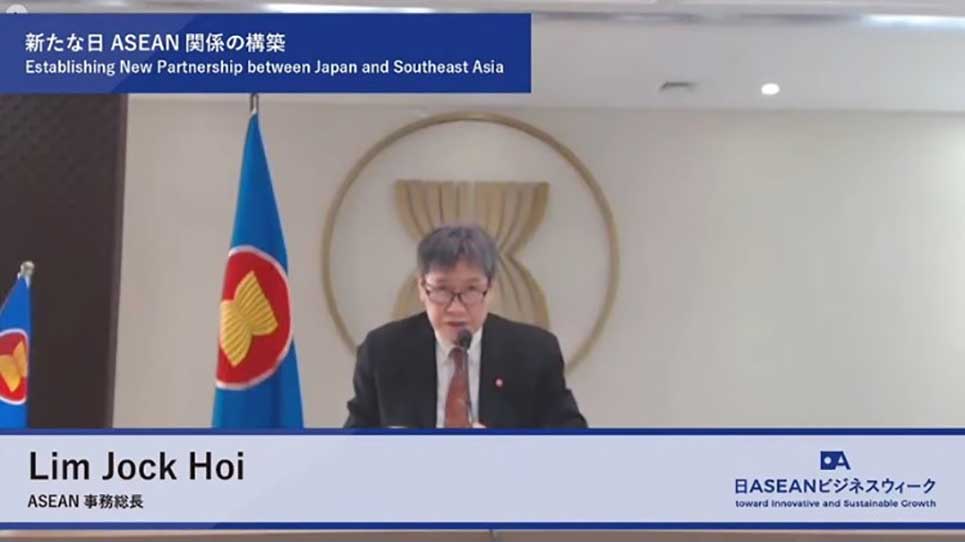
Participation of the private sector holds the key to the further growth of ASEAN. In addition, digitization and sustainability are two key factors for future economic development.
Recent launch of the Mid-Term Review (MTR) Report of the ASEAN Economic Community Blueprint 2025 reaffirmed that new development and trends including digitization and sustainability will actively be adopted moving forward. These areas are also included in the 13 Priority Economic Deliverables (PEDs) set by Brunei Darussalam, as the ASEAN chair this year. Additionally, the ASEAN Digital Master Plan 2025 (ADM 2025) and its action plans under the ASEAN Digital Integration Framework have also been prepared with the perspective of developing a secure, open and high-quality digital infrastructure.
Regarding the sustainability and green growth in the region, ASEAN is promoting sustainable financing in the region under the processes stipulated by Finance Ministers and the Central Bank’s Governors. Namely, the sustainable finance initiative such as ASEAN Green Bond Standards have been announced, along with the promotion of cross-cutting efforts involving multiple industries such as banking and insurance to foster sustainable capital markets across the region. The ASEAN version of the taxonomy has also been established. It is clear that ASEAN has recognized the importance of uniting the strengths of all stakeholders including business communities in the region, not only the governments of each ASEAN country.
It is thus important for Japanese companies to continue to maximizing cross-border manufacturing and production activities within the ASEAN region, restoring ASEAN countries’ supply chain by utilizing digital technologies including e-commerce for the post pandemic economic recovery, as well as to mobilize various financing tools and sustainable investment towards carbon neutrality.
Keynote speech: New Business Opportunities in Southeast Asia
Sasaki Nobuhiko (Chairman, Japan External Trade Organization)
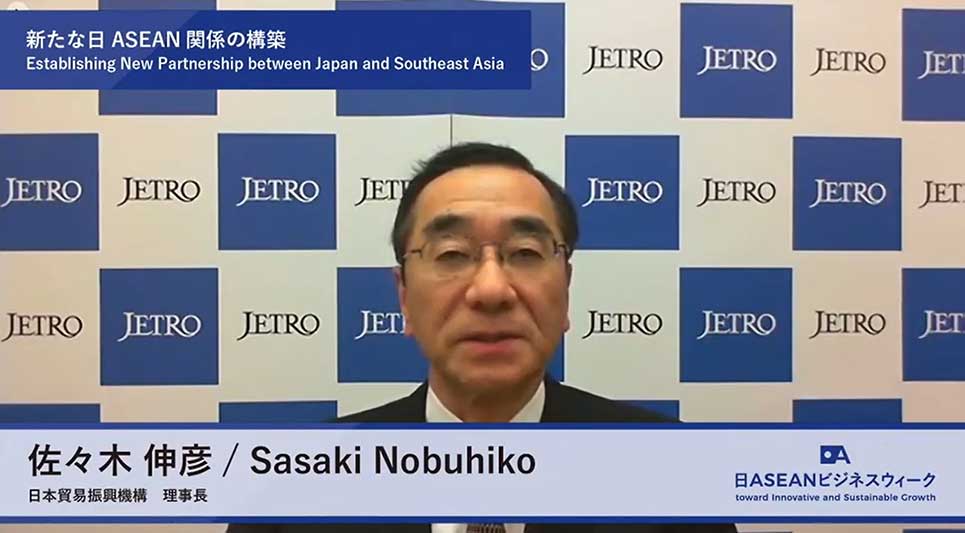
Japanese companies have contributed to Southeast Asia through job creations, technology transfers and human resource developments more than half a century, especially in the manufacturing industry. Meanwhile, the governments of Southeast Asian countries - also heard of business voices to further improve business environment. We both have deepened mutual trust, developed and maintained great relationships.
ASEAN has been actively proceeding with trade liberalization, and as a result, finally signed a Regional Comprehensive Economic Partnership Agreement (RCEP) last year. This contributed the region to be highly recognized as a global supply chain base, and I would like to express my respect for the efforts toward economic integration. The value of foreign investments into Southeast Asia increased 5 times in the 20 years from various industries, not only manufacturing but also finance, retail, real estate, etc. The shift in the industrial structure to the non-manufacturing industry has led to a discovery of new demands in each country. The service industry is about solving the problem and realizing wish in our daily life. Due to the COVID-19 crisis, digital tools hugely play an active role to satisfy demands across the national borders. Particularly the young generation in Southeast Asia is adapting and boosting this trend.
A lot of startups in Southeast Asia, such as Grab, have grown their business rapidly. They are tackling numerous social challenges, and Japan has a lot to learn from their quick actions and flexible adaptability. In Southeast Asia, digital technologies are utilized not only in manufacturing, R&D, inventory management, logistics but also in medical treatment, education, blockchain, and payment. Besides, there is new business opportunities to bring digitalization into traditional industries such as agriculture and fisheries.
JETRO launched J-Bridge as a new platform to increase foreign business opportunities for Japanese companies which is one project of the "ASEAN-Japan Economic Resilience Action Plan" endorsed between Minister Kajiyama and ASEAN Economic Ministers last July. Through this new platform, JETRO would put our effort to promote collaboration between Japanese companies and ASEAN start-ups, to give a new perspective on business in ASEAN region to Japanese companies, to contribute to economic recovery from COVID-19, and to develop further win-win relationships.
Mimura Akio (Chairman, the Japan Chamber of Commerce and Industry)
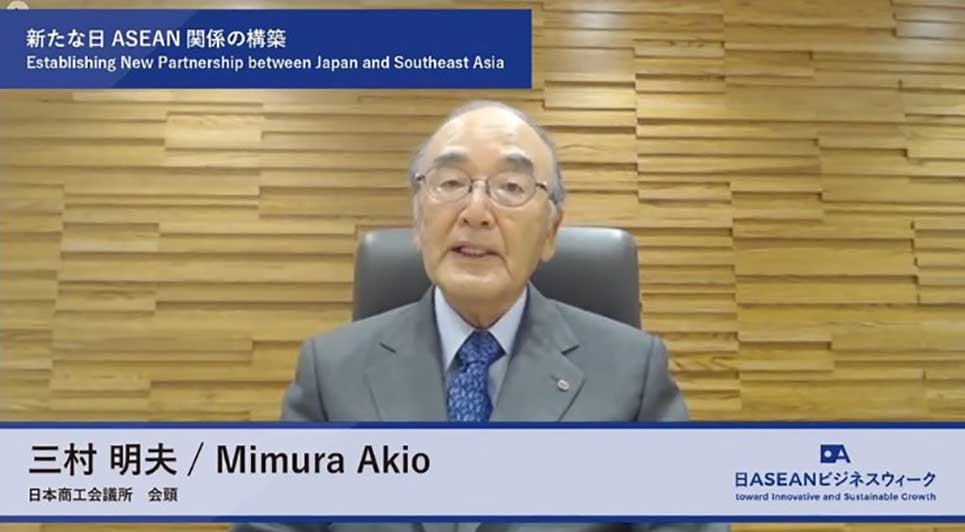
Amid COVID-19 pandemic, companies’ ability to adapt themselves to the situation is being tested. While maintaining the business and keeping employment, many companies are dealing with business transformation, productivity improvement through digitalization and business succession. On the other hand, many Japanese SMEs give key focus on domestic market with lower export ratio against its total turnover at 3.4%. As a result, we hope that such SMEs will focus more on overseas expansion as part of their adaptation process and incorporate the dynamism of Asian growth into their own companies’ growth. Above all, we hope these companies would pay attention to Southeast Asia, a region close to Japan.
Highlighting the secondary title of this ASEAN-Japan Business Week namely "toward Innovative and Sustainable Growth”, we consider this as good business opportunities for Japanese companies to take this chance to grow together and to become heart to heart and equal partner with ASEAN and to achieve its common goal towards sustainable growth.
Focusing on ASEAN local offices of Japan Chamber of Commerce and Industry (JCCI) formulated by local Japanese companies in each ASEAN countries, their main tasks are to provide the latest information on laws, tax systems, regulations, etc. and to offer various supports/activities for smooth business operations of newly started Japanese companies, such as organizing networking event. Moreover, the JCCI considers Southeast Asia as a growth frontier to take Japanese SMEs to the next level and has launched this year, a new project called the "Overseas Business Development Initiative" collaborating with JETRO, JICA, JCCI throughout all regions of Japan to actively support overseas business operations especially SMEs.
Hara Noriyuki (Chairman, Committee on Asia and Oceania, Keidanren)
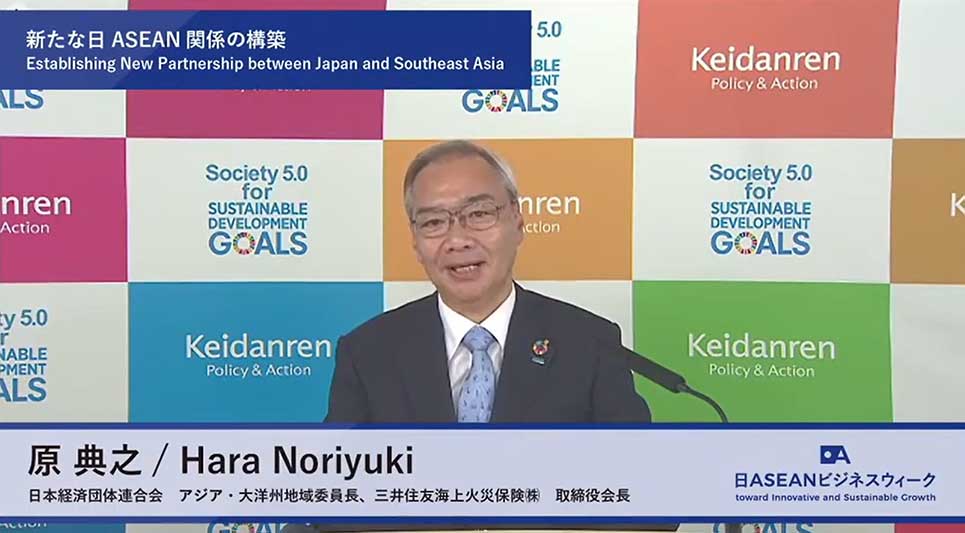
Looking ahead to the post-COVID-19 era, what everyone should do now is to promote digital transformation (DX) and restore the world economy, while solving various global issues and creating a sustainable society.
With this awareness, Keidanren announced the ". the NEW Growth Strategy" last November. The strategy emphasizes the importance of establishing sustainable capitalism through "Society 5.0 for SDGs" aiming to solve social problems and at the same time achieve business growth by utilizing the latest digital technologies. The key here is "value co-creation," in which companies create new value in collaboration with various players. In particular, value co-creation with the international community is critical to solve global issues and achieving growth.
Above all, the relationship with ASEAN is extremely important. For Japanese companies, ASEAN is an inseparable partner with strong ties, and at the turning point of this era, collaborative creation between Japan and ASEAN has even greater significance for the development of both parties.
In moving forward, we feel it is necessary to promote collaborative creation with ASEAN in the following three fields:
The first is to strengthen the ASEAN connectivity through the development of hard infrastructures such as roads and electric power, as well as soft infrastructure such as digitization in logistics, which Japanese companies have been continuously involved in.
The second is digital technology for social development through collaboration between Japan and ASEAN. This includes collaboration with ASEAN start-ups in order to solve social issues and achieve growth with digital technologies.
The third is the commitment to sustainable growth. For example, there are many things that Japanese companies can contribute to ASEAN, such as the diffusion of excellent environmental technologies that can contribute to decarbonization and prevention and mitigation of natural disaster.
Furthermore, as a basis for promoting these efforts, Japan and ASEAN need to jointly cooperate in maintaining and strengthening the free trade and investment system, which is indispensable for the smooth promotion of business activities.
The deepening and further growth of ASEAN as a community will lead to the development of the entire Asian region and the world economy. In addition, as Japan and ASEAN cooperate while leveraging each other's strengths, their business opportunities will further expand conclusively. Keidanren therefore would like to continue working in deepening the relationship with ASEAN.
Keynote speech: Deepening Japanese Engagement with ASEAN region
in the Post-COVID-19 Era
Tamura Akihiko (Director-General for Trade Policy, Ministry of Economy, Trade and Industry)
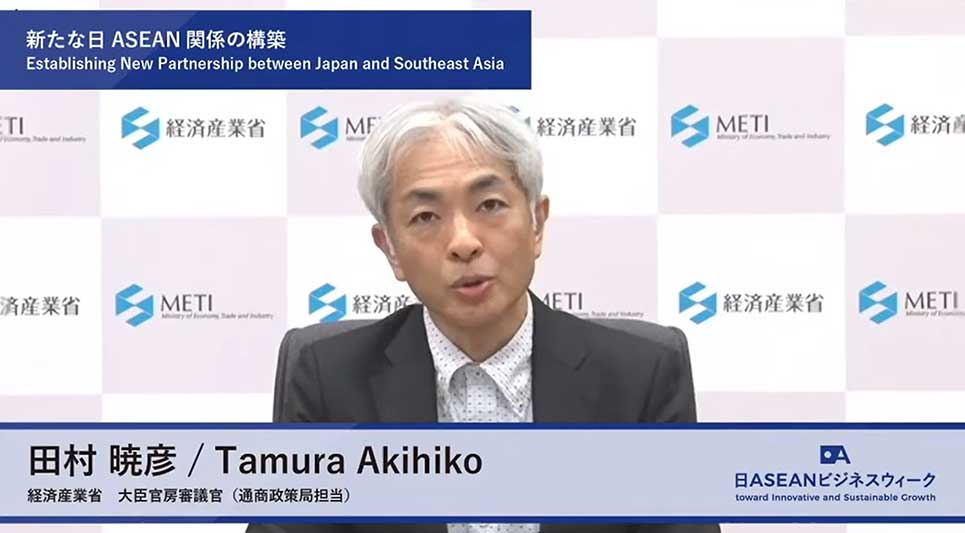
Historically Japan and ASEAN have evolved together for over half a century by deepening economic relations. In the 1990s, Japan positioned ASEAN as an important production base and provided various support for carrying out "flying geese model". Then, in the 2000s, in response to the movement toward ASEAN regional economic integration, the EPA (Economic Partnership Agreement) negotiations were promoted, and the construction and expansion of production network throughout the region took place.
ASEAN is becoming more attractive as a market with its remarkable economic growth, but at the same time, it is going through various changes. The responses to the COVID-19 outbreak and early full-scale economic recovery would be the urgent tasks for ASEAN. With the rapid economic development, new social issues such as regional disparities, social infrastructure and institutional development have also become apparent. When we talk about the changes in ASEAN, global trends such as economic digitization and responses to climate change issues cannot be ignored either. In particular, the progress of digitalization in the region, described as "leapfrogging" and the growing presence of foreign companies are notable events. Moreover, in regard to climate change issue, as the world is being steered toward a greener trend, ASEAN will be expected to take actions toward the going green strategies/plans like every other country.
Focusing on deepening of ASEAN-Japan cooperation, there are three key points to be considered. The first is to strengthen cooperation towards the early recovery from COVID-19 pandemic. The second is the transformation to lucrative business model by co-creating businesses with ASEAN’s local partners with use of open innovation. Namely, "Monozukuri" represented by the Japanese manufacturing industry so far is based on the projects of Japanese companies or affiliated companies, investing and developing infrastructure overseas, and expanding the production network to reduce overall costs and improve productivity. However, a shift to a new business models such as business development that meets local needs, the combination of goods and services, or the provision of solutions to problems are also required. To move forward, it is vital to co-create businesses with ASEAN’s local companies as partners and exploit open innovation. The last but not least, the third is enhancing energy transition and partnership on green growth with ASEAN. Achieving economic growth and responding to climate change would therefore be essential for the future of ASEAN. In this context, Japan is prepared to tackle these issues together with ASEAN.
With these three key points in mind, the Ministry of Economy, Trade and Industry (METI) would encourage further achievements on the ASEAN-Japan Economic Resilience Action Plan, Asia DX Projects, Dialogue for Innovative & Sustainable Growth (DISG), Supply Chain Resilience Forum as well as the Asia Energy Transition Initiative (AETI) in collaborative efforts with ASEAN.
